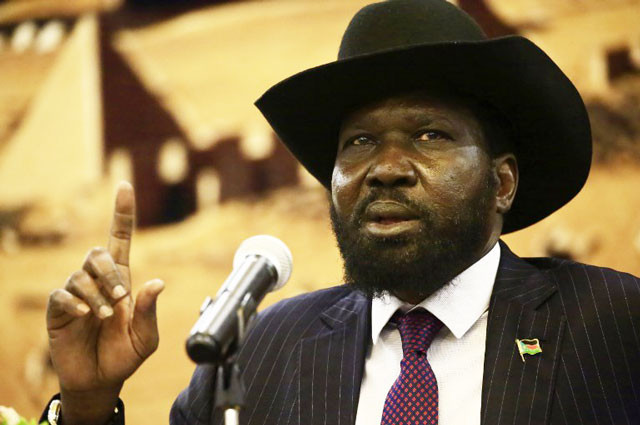
Juba, South Sudan | AFP | South Sudan President Salva Kiir on Friday dismissed international calls for compromise with his foes to break a deadlock that threatens a ceasefire in their six year war.
Kiir and rebel chief Riek Machar are under increasing pressure to resolve their differences by February 22 and form a unity government as part of a peace agreement.
The pair have already missed two previous deadlines to enshrine peace to end a war that has left at least 380,000 people dead and millions in dire poverty.
But with a week to go before the clock runs out, Kiir said he would not back down on the key sticking point of the deal — the number of regional states in the young nation.
“This thing cannot work, because we cannot solve problems with another problem,” Kiir said, as he addressed supporters at a rally in the capital Juba.
The number of states is contentious because the borders will determine the divisions of power in the country.
When it gained independence from Sudan in 2011, South Sudan had 10 states, as set out in the country’s constitution. Kiir increased that in 2015 to 28, and then later 32.
Critics said redrawing the state boundaries was a divide-and-rule plan to split opposition strongholds and ensure government loyalists dominated.
Kiir argues reducing the states would cause conflict, and dismissed Machar’s proposal to a return to the original 10.
“When Riek Machar said ‘let us return to 10 states,’ I told him, my brother… what will you do with the civil servants in the 32 states?” Kiir said on Friday.
Machar has said he cannot return to his old job as vice-president if the status quo on states remains.
Envoys have called on both sides to stick to their ceasefire and to compromise.
“A credible unity government needs to be inclusive… and cannot be formed on the basis of unilateral action,” Britain, the United States and Norway said in a joint statement on Wednesday.
Kiir and Machar are old rivals who have fought and made up multiple times.
“We urge the parties to not allow the peace agreement to collapse just because of dispute on the number of states,” the South Sudan Civil Society Forum said Friday, an umbrella group of over 200 development organisations.
 The Independent Uganda: You get the Truth we Pay the Price
The Independent Uganda: You get the Truth we Pay the Price



